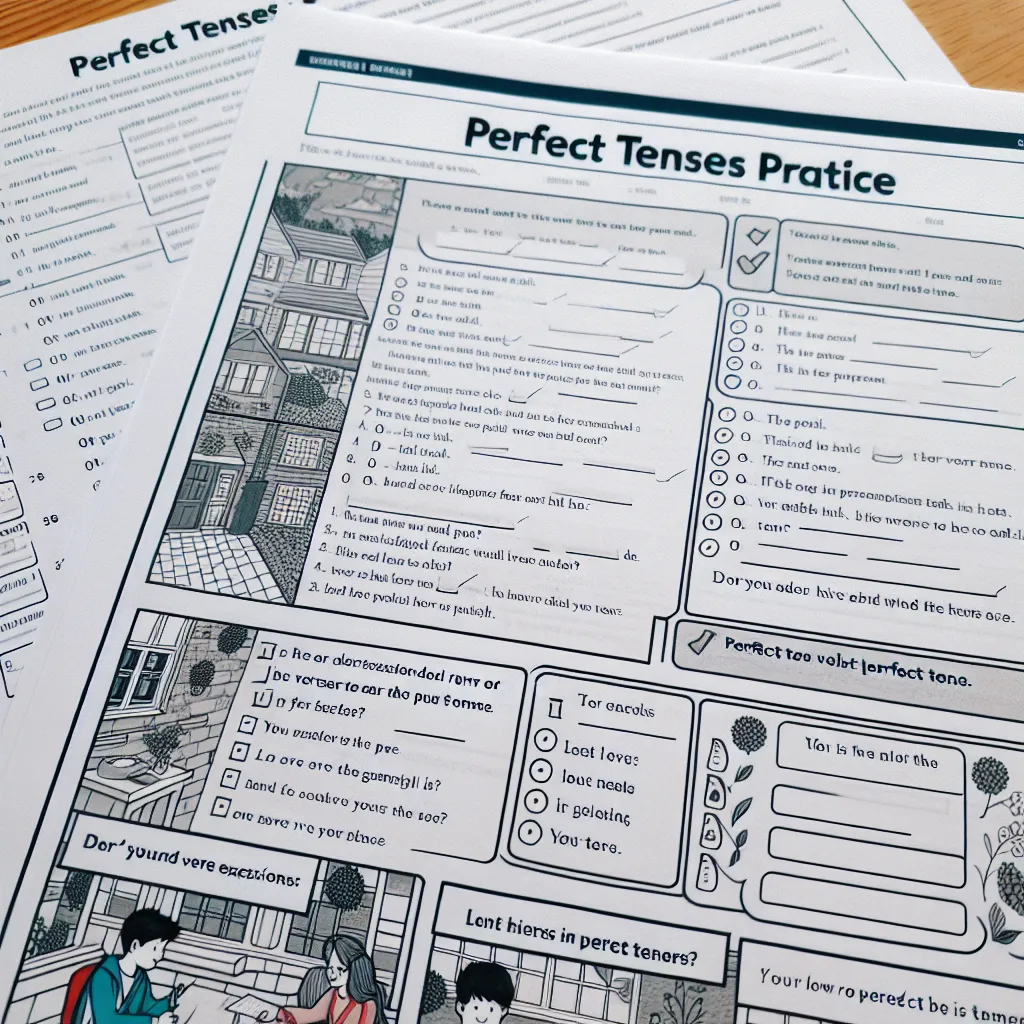Are you struggling to master the perfect tenses in English? You’re not alone. Many English learners find these tenses challenging, but with the right approach, you can confidently use them in your speaking and writing. This guide will help you perfect your use of perfect tenses, providing clear explanations, practical examples, and effective strategies.
Understanding Perfect Tenses
Perfect tenses are used to express completed actions or states. They help us connect different time periods and show relationships between past, present, and future events. There are three main perfect tenses in English: present perfect, past perfect, and future perfect.
Why Are Perfect Tenses Important?
Perfect tenses are crucial for:
- Expressing completed actions
- Showing the order of events
- Discussing experiences and achievements
- Describing ongoing situations with present results
Understanding and using these tenses correctly can significantly improve your English fluency and accuracy.
 Perfect Tenses Timeline
Perfect Tenses Timeline
Mastering Each Perfect Tense
Let’s break down each perfect tense and explore how to use them effectively.
Present Perfect
The present perfect tense connects the past to the present. It’s formed using “have/has + past participle.”
Examples:
- I have visited Paris three times.
- She has lived in London since 2010.
Key uses:
- Discussing experiences
- Describing actions with present results
- Talking about unfinished time periods
Tip: Practice using time expressions like “already,” “yet,” “ever,” and “never” with the present perfect.
Past Perfect
The past perfect describes an action that happened before another past action. It’s formed using “had + past participle.”
Examples:
- By the time I arrived, the movie had already started.
- She realized she had forgotten her keys.
Key uses:
- Showing the order of past events
- Expressing regrets or hypothetical situations in the past
Tip: Use the past perfect in combination with the simple past to clearly show the sequence of events.
Future Perfect
The future perfect describes actions that will be completed by a specific time in the future. It’s formed using “will have + past participle.”
Examples:
- By next year, I will have graduated from university.
- They will have finished the project before the deadline.
Key uses:
- Predicting completed future actions
- Discussing accomplishments expected by a future time
Tip: Practice using time expressions like “by,” “before,” and “by the time” with the future perfect.
Common Challenges and Solutions
Challenge 1: Distinguishing Between Simple Past and Present Perfect
Many learners struggle to choose between these tenses. Remember:
- Use simple past for completed actions at a specific time in the past.
- Use present perfect for actions with a connection to the present or unfinished time periods.
Example:
- I visited Paris last year. (Simple Past)
- I have visited Paris three times. (Present Perfect)
Challenge 2: Overusing the Perfect Tenses
While perfect tenses are important, overusing them can make your speech sound unnatural.
Solution: Focus on using perfect tenses when necessary to show relationships between events or to emphasize completion.
Challenge 3: Irregular Past Participles
Many verbs have irregular past participles, which can be confusing.
Solution: Create a list of common irregular verbs and their past participles. Practice using them in sentences regularly.
 Perfect Tenses Exercise
Perfect Tenses Exercise
Practical Exercises to Improve Your Skills
-
Timeline Practice: Create a personal timeline and describe events using all three perfect tenses.
-
News Report Activity: Watch a news report and try to identify uses of perfect tenses. Then, summarize the report using perfect tenses where appropriate.
-
Story Completion: Read the beginning of a story and use perfect tenses to continue it, showing the relationships between events.
-
Conversation Practice: With a partner, discuss your life experiences using present perfect. Then, talk about your future plans using future perfect.
-
Error Correction: Review texts with perfect tense errors and try to correct them. This helps you recognize common mistakes.
For more exercises and in-depth explanations, check out our guide on mastering the use of tenses in storytelling.
Tips for Long-term Improvement
-
Read extensively in English, paying attention to how perfect tenses are used in context.
-
Keep a journal, consciously using perfect tenses to describe your experiences and plans.
-
Use language exchange apps to practice speaking with native speakers, focusing on perfect tenses in real conversations.
-
Set specific goals, such as mastering one perfect tense each week, and track your progress.
-
Use grammar-checking tools to analyze your writing and identify areas for improvement.
Conclusion
Perfecting The Use Of Perfect Tenses takes time and practice, but with consistent effort and the right strategies, you can significantly improve your English grammar skills. Remember to focus on understanding the context and purpose of each perfect tense, rather than just memorizing rules. Practice regularly, seek feedback, and don’t be afraid to make mistakes – they’re an essential part of the learning process.
Do you have any specific questions about perfect tenses? Share your experiences or challenges in the comments below, and let’s continue learning together!




